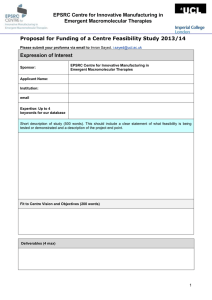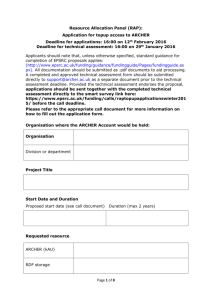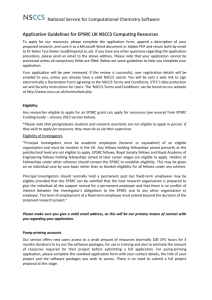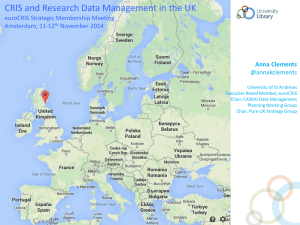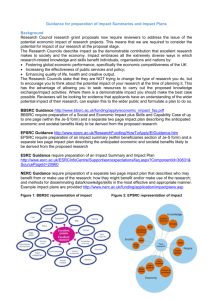epsrc - Research Data Management
advertisement
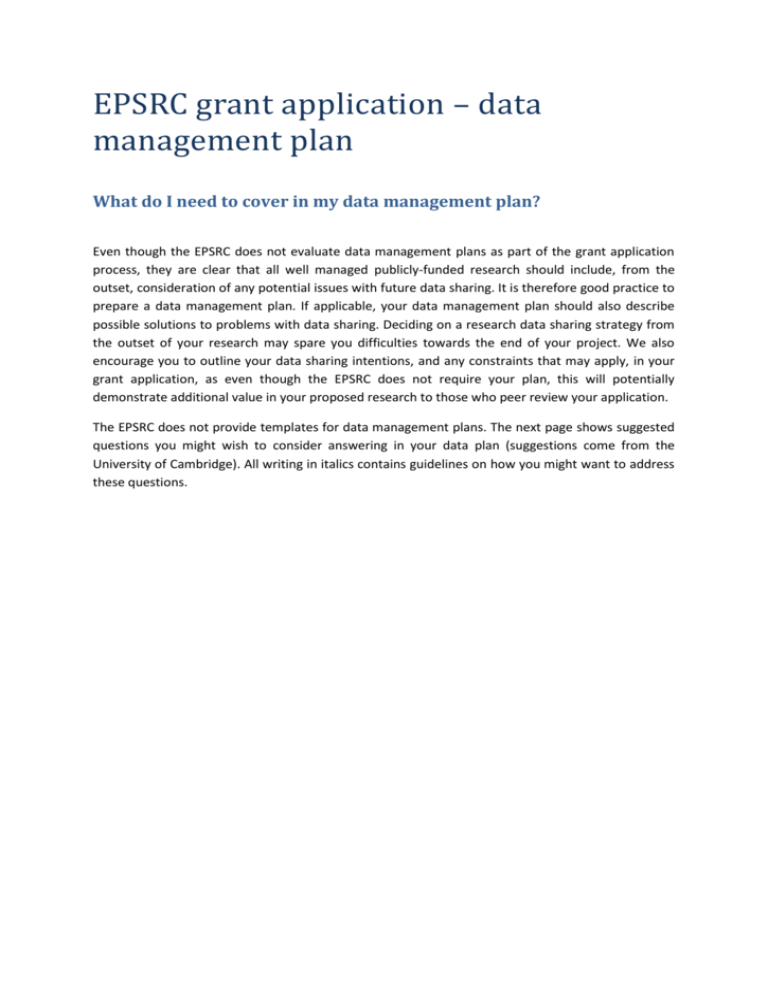
EPSRC grant application – data management plan What do I need to cover in my data management plan? Even though the EPSRC does not evaluate data management plans as part of the grant application process, they are clear that all well managed publicly-funded research should include, from the outset, consideration of any potential issues with future data sharing. It is therefore good practice to prepare a data management plan. If applicable, your data management plan should also describe possible solutions to problems with data sharing. Deciding on a research data sharing strategy from the outset of your research may spare you difficulties towards the end of your project. We also encourage you to outline your data sharing intentions, and any constraints that may apply, in your grant application, as even though the EPSRC does not require your plan, this will potentially demonstrate additional value in your proposed research to those who peer review your application. The EPSRC does not provide templates for data management plans. The next page shows suggested questions you might wish to consider answering in your data plan (suggestions come from the University of Cambridge). All writing in italics contains guidelines on how you might want to address these questions. Data management plan – suggested questions and possible considerations 1. What type of data will you generate in your project? E.g. experimental measurements, software, video recordings, images 2. What will be the volume (size) of your data? Will you require financial support to share your data? Remember to budget for research data sharing in your grant proposal. The cost of data sharing via the University of Cambridge data repository is £4/GB, as a one-off charge for storing your data for 10 years from the last access. The total charge will be £4/GB multiplied by the total amount of GB of data you are submitting to us. So for example, if you are submitting 4.5GB of data, we will invoice your grant for £18. 3. - File formats What metadata standards will you use for your data and why? o In order to maximise the potential for re-use of data, researchers are suggested to generate and manage data using existing widely accepted formats where possible. o If you generate data in proprietary file formats, is it possible to export your data into open file formats? 4. What are your proposed data management strategies? Possible items to be discussed here: a) Your data backup strategy – will you regularly backup your data? b) How will you share your data with your collaborators during the project? c) You data organisation or file naming conventions, for example, TILS file naming convention: http://www.tils.qut.edu.au/initiatives/informationmanagement/documents/GDL_TILSDocNa ming_V1_20090612.pdf d) You might want to say that you will follow University’s guidelines on research data management, as outlined in the University of Cambridge Research Data Management Policy Framework: http://www.data.cam.ac.uk/university-policy 5. How will you describe your data? - Data should be accompanied by the contextual information or documentation (metadata) needed to provide a secondary user with any necessary details on the origin or manipulation of the data in order to prevent any misuse, misinterpretation or confusion. - You may say here that you will follow disciplinary guidelines, if they exist (for example, as created for proteomics experiments: http://www.psidev.info/node/91). If no disciplinespecific standards exist, you may decide to follow the disciplinary guidelines prepared by the Digital Curation Centre: http://www.dcc.ac.uk/resources/metadata-standards 6. Secondary use - Do you think your data are valuable and worth sharing? - Do you foresee any future use/re-use of your data after the end of your project? 7. Methods for data sharing - What are your plans for data sharing? Where would you like to deposit your data? Are you considering depositing your data into a data repository, which guarantees that your data will be accessible for 10 years from the last access to your data? (as required by the EPSRC)? o Information on available data repositories can be found here: http://www.data.cam.ac.uk/repository o You may also share your data via the University of Cambridge data repository: https://www.repository.cam.ac.uk/ - Restricting access to research data Are you working with commercial/patentable/sensitive data? If you need to restrict the access to your data because these are commercially important/patentable/sensitive data, you should explain it here. Are there any ways you can overcome potential problems with data sharing? Information on the use of possible exemptions from data sharing is available here: http://www.data.cam.ac.uk/faq-0/exemptions 8. Timeframes - What is the timeline when you will release research data resulting from the project? o For example, you may wish to say that all results from this research will be published, and data will be released together with publications (as expected by the EPSRC)
